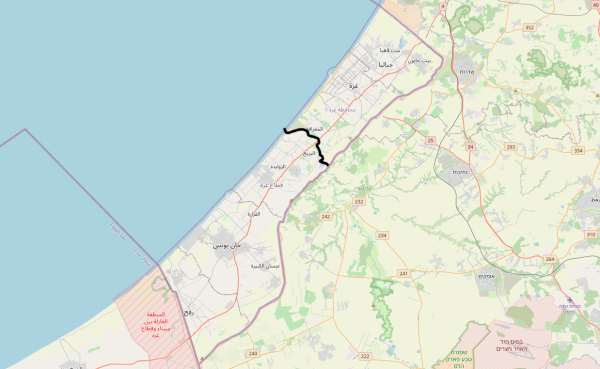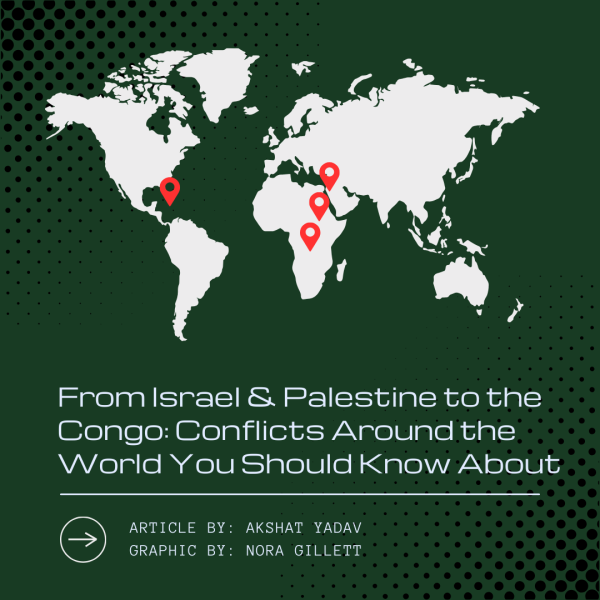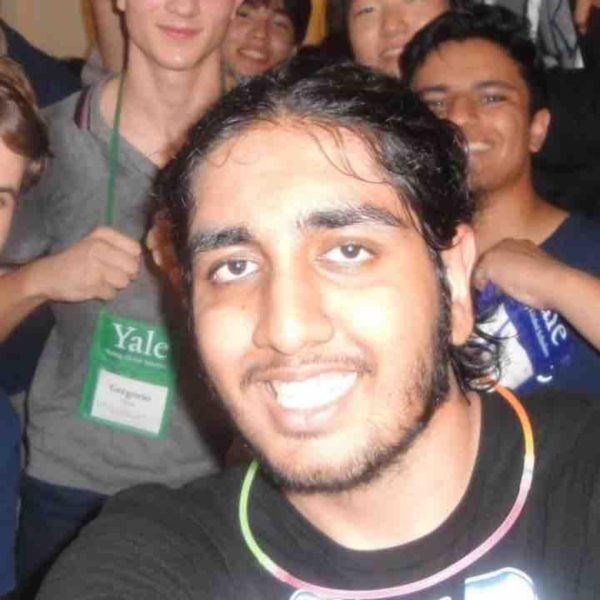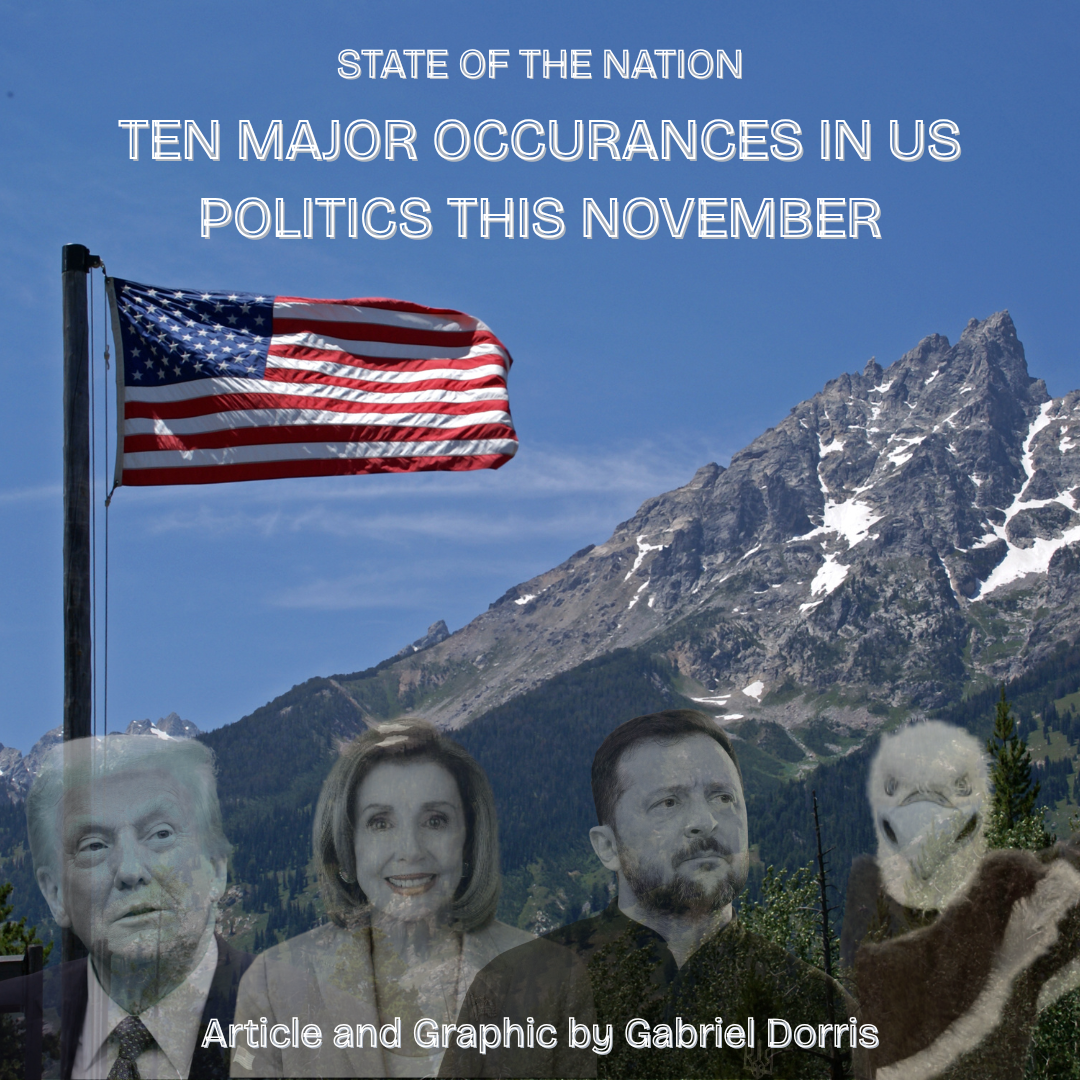Israel-Palestine
On Oct. 7, Hamas, a militant group governing the Gaza territory of Palestine, launched Operation Al-Aqsa Flood, what the group describes as a retaliation after Israel’s 2021 raid on Al-Aqsa Mosque in Jerusalem and an effort to defend the self-determination of Palestinians. During the operation, Hamas launched a barrage of thousands of missiles toward Israeli territories and began a ground invasion of Israel an hour later.

During the Hamas infiltration of Israel, the group’s fighters attacked Israeli towns and villages, military installations, and a nearby music festival. Local police and health officials estimated that 1,200 Israelis died, 846 of them being civilians.
After the initial attack took place, Israel convened an emergency government and launched a counter-operation to eliminate Hamas and the Palestinian Islamic Jihad group.
Since then, the Israeli Defense Force (IDF), the military of Israel, has conducted airstrikes on Hamas targets throughout Gaza and ordered all those living north of the Wadi Gaza (a stream marked by the black line on the map on the right) to evacuate to the south.
The IDF has since faced intense criticism from foreign governments and non-government organizations for the high civilian death toll of the retaliatory strikes. According to estimates by the Palestinian Health Ministry based in the West Bank, over 10,000 Palestinians have been killed by Israeli airstrikes.
Massive rallies have erupted in response to the conflict in the United States and worldwide. Issues raised by protestors include calls for a ceasefire, the return of Israeli hostages, providing humanitarian aid to Gaza, and protests against the United States government’s stances in the conflict.
Instability and Crisis in Haiti
Since Haiti declared independence from France in 1804, it has been plagued by coups, conflict with the neighboring Dominican Republic, natural disasters, and debt payments to France. All of these contribute to the nation’s economic, social, and political instability.
The capital of Haiti, Port-au-Prince, is currently dominated by gangs and is the site of intense fighting between the two major gang alliances in the city, the G9 Alliance and the G-Pep Alliance. The United Nations Security Council recently approved a Kenyan-led multinational support mission to work with the local police and restore order in the capital and other areas impacted by the gang war.
Sudan
As part of Sudan’s civil war in the western Sudanese region of Darfur, the nation’s military took the support of the Janjaweed, an Arab militia group. The group, led by Mohamed Hamdan Dagalo (Hemedti), has been accused of violating international law and committing several war crimes. Despite this, Sudan relied upon the group (later reorganized as the Rapid Security Forces/RSF) to address flare-ups in Darfur and even deployed it to other countries (Yemen and Libya).
In 2019, the Military (with RSF support) removed Sudanese President Omar Al-Bashir as part of the Sudanese revolution. After intense civilian protest and international pressure, the military handed over power to a transitional civilian government in August of 2019. The civilian government didn’t last long, as the Sudanese military and RSF overthrew the new government and established another military junta.
 The recent conflict began as the relations between the RSF and the broader military Junta deteriorated, as they disagreed over the timeline of the RSF’s integration into the military and control over the Sudanese economy. In April of 2023, the conflict started as the RSF deployed troops into Khartoum, the country’s capital. The map on the left shows the lines of control as of November 18th. The gray shows RSF control, and the pink represents control by the Sudanese Armed Forces.
The recent conflict began as the relations between the RSF and the broader military Junta deteriorated, as they disagreed over the timeline of the RSF’s integration into the military and control over the Sudanese economy. In April of 2023, the conflict started as the RSF deployed troops into Khartoum, the country’s capital. The map on the left shows the lines of control as of November 18th. The gray shows RSF control, and the pink represents control by the Sudanese Armed Forces.
Conflict in Congo and Eastern Africa
The Democratic Republic of the Congo (DRC) and Rwanda have had a strained relationship ever since the Rwandan genocide during the Rwandan Civil War in 1994. During the genocide, extremist members of the Hutu group killed millions of people belonging to the Tutsi group as well as moderate Hutus. As the genocide occurred, roughly two million Hutus moved to the neighboring DRC, some of whom were extremists.
The post-genocide Tutsi government of Rwanda and allied groups in the region declared war on the DRC (formerly known as Zaire) in 1996, justifying it by stating the Hutu extremist groups that were building up in the country were a threat to Rwanda’s security. This led to the First Congo War. The war was won by Rwanda and resulted in Mobutu Sese Seko, the then President of Zaire, fleeing the country and the opposition leader, Laurent-Désiré Kabila, taking power.
Kabila’s relations with the former allies of Uganda and Rwanda suffered as the leader attempted to distance himself from the very countries that helped put him in power. Actions such as forcing foreign military forces out of the country and allowing Hutu resistance groups to build up at the border led to the Second Congo War in 1998. It was started as Rwanda invaded the DRC, citing the need for a buffer area to distance itself from Hutu groups in bordering areas. The war, which involved countries surrounding Africa, ended with a peaceful transition, with Kabila’s son (Kabila himself was assassinated) leading the country subsequently.
Amidst this post-Congolese war era, a primarily Tutsi-composed rebel group called the March 23 Movement (M23) rose to power. The group’s influence spread greatly over portions of the Eastern DRC, and it was alleged that Rwanda was funding the group. Evidence of this further deteriorated relations between the two. The group was subdued through continued pressure by the DRC’s army and support from the United Nations Organization Stabilization Mission in the Democratic Republic of the Congo (MONUSCO).
Despite the efforts, the group’s influence has risen in the past two years as it has begun to take control of parts of the DRC provinces that border Rwanda and Burundi. Violence has been spiking at alarming rates, with reports coming that the M23 group is engaging in attacks against civilians and those in displacement camps.
The conflict has raised the eyes of several international entities as the presence of minerals (such as 70% of the world’s cobalt reserves) in the DRC (especially concentrated in the eastern part of the nation) remains highly contentious and vital to producing technological products. China has provided the Congo with infrastructure funding and military aid; meanwhile, the U.S. has recently begun talks with leaders of Rwanda and the DRC and is calling for negotiations between the two parties.
Works Consulted
Abdelaziz, Khalid, et al. “Sudan’s Army Chief, Paramilitary Head Ready to De-Escalate Tensions, Mediators Say.” Reuters, 15 Apr. 2023, www.reuters.com/world/africa/sudanese-politicians-blame-bashir-loyalists-discord-2023-04-14/. Accessed 6 Dec. 2023.
Boxerman, Aaron. “What We Know about the Death Toll in Israel from the Hamas-Led Attacks.” The New York Times, 12 Nov. 2023, www.nytimes.com/2023/11/12/world/middleeast/israel-death-toll-hamas-attack.html.
Center for Preventive Action. “Israeli-Palestinian Conflict.” Global Conflict Tracker, Council on Foreign Relations, 6 Nov. 2023, www.cfr.org/global-conflict-tracker/conflict/israeli-palestinian-conflict.
—. “Violence in the Democratic Republic of Congo.” Global Conflict Tracker, 3 Aug. 2022, www.cfr.org/global-conflict-tracker/conflict/violence-democratic-republic-congo.
“Chaos in Haiti Escalates as Gang Violence, Fuel Shortages Threaten Access to Health Care.” Partners in Health, www.pih.org/article/chaos-haiti-escalates-gang-violence-fuel-shortages-threaten-access-health-care.
Dyer, Evan. “In Haiti, a Grassroots Vigilante Movement Is Fighting Back against Gang Warfare.” CBC, 8 May 2023, www.cbc.ca/news/politics/haiti-bwa-kale-port-au-prince-gang-warfare-1.6833758.
“Fears in Sudan as Army and Paramilitary Force Face Off.” Www.aljazeera.com, www.aljazeera.com/news/2023/4/13/sudans-army-warns-of-rsfs-movements-in-khartoum-other-cities.
Jazeera, Al. “UN Peacekeepers Leave Haiti: What Is Their Legacy?” Aljazeera.com, Al Jazeera, 4 Oct. 2017, www.aljazeera.com/news/2017/10/peacekeepers-leave-haiti-legacy-171004144515853.html.
“New Gang Battle Lines Scar Haiti as Political Deadlock Persists.” Www.crisisgroup.org, 27 July 2022, www.crisisgroup.org/latin-america-caribbean/haiti/new-gang-battle-lines-scar-haiti-political-deadlock-persists.
Picheta, Caitlin Stephen Hu, Richard Roth, Rob. “UN Warns of “Blatant Disregard for Basic Humanity” in Gaza Warfare.” CNN, 5 Dec. 2023, www.cnn.com/2023/12/05/middleeast/un-warnings-gaza-israel-hamas-intl/index.html.
Regan, Eyad Kourdi,Amir Tal,Abeer Salman,Celine Alkhaldi,Helen. “Israel Steps up Gaza Offensive as Brutality of Hamas Attacks Laid Bare.” CNN, 11 Oct. 2023, www.cnn.com/2023/10/11/middleeast/israel-gaza-hamas-war-wednesday-intl-hnk/index.html.
Robles, Frances, and Farnaz Fassihi. “U.N. Approves Kenya-Led Security Mission to Help Haiti Stamp out Gangs.” The New York Times, 2 Oct. 2023, www.nytimes.com/2023/10/02/world/americas/un-kenya-mission-haiti.html.
“Sudanese General’s Path to Power Ran through Darfur.” AP News, 20 May 2019, apnews.com/article/b5eba878a74445eb90febe4ec9231917. Accessed 6 Dec. 2023.
“The Second Congo War: Its Origins and Initial Stages.” ThoughtCo, 2019, www.thoughtco.com/second-congo-war-43698.
“United Nations Statistics Underscore “Extreme Brutality” of Haiti’s Gangs.” Www.aljazeera.com, www.aljazeera.com/news/2023/8/19/united-nations-statistics-underscore-extreme-brutality-of-haitis-gangs.
Walsh, Declan. “Rival Generals Unleash Fighting in Sudan, Dashing Dreams of Democracy.” The New York Times, 15 Apr. 2023, www.nytimes.com/2023/04/15/world/africa/khartoum-sudan-fighting.html.








